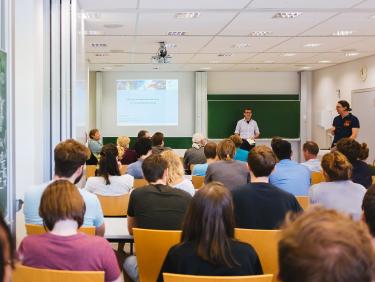Teaching
Environmental Physics offers numerous courses in the Master's degree program in Physics. The Master's lecture in Environmental Physics (MKEP4) forms the core of the course and can already be attended during the Bachelor's degree program.
Our lectures are accompanied by computational exercises and cover all essential aspects of the energy budget of the climate system, and the equations of motion of fluids, as well as turbulence and vorticity. The focus is also on the global circulation of the atmosphere and the ocean, the thermal structure of fluids, radiative transfer in the atmosphere and much more. In special lectures and seminars we deal with numerical modeling and in-depth insights into the dynamics of the atmosphere, the hydrosphere or the climate system as a whole. Practical courses provide insights into research methods.

Attention!

I am studying environmental physics because it offers me the opportunity to work in the field, to come into direct contact with fascinating nature and to discover its secrets using precise physical techniques.
Linus Langenbacher, BSc 8. Semester
Doctoral candidates
Heidelberg University offers its PhD candidates a wide range of doctoral programmes with diverse levels of structuring – individual doctoral training, small and medium-sized training groups, or large Graduate Schools.

I study environmental physics because it is really fascinating to work in nature and explore its hidden mechanisms. Through hydrology, I had the opportunity to go into the field, collect my own samples, measure them in the lab and ultimately contribute to the understanding of groundwater.
Christoph West, MSc 13. Semester


